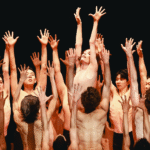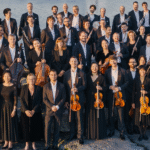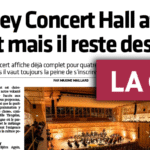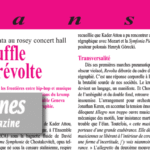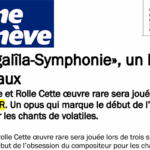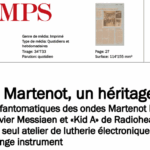MORCHEEBA
« BLACKEST BLUE »
Le concert de rentrée en fanfare, auquel tous les Roséens assistent, lance notre neuvième saison sur des airs trip-hop, soul et pop ! Une invitation à se laisser porter par des sonorités différentes au rythme soutenu.
Marie-Noëlle Tirogalas
PROGRAMME
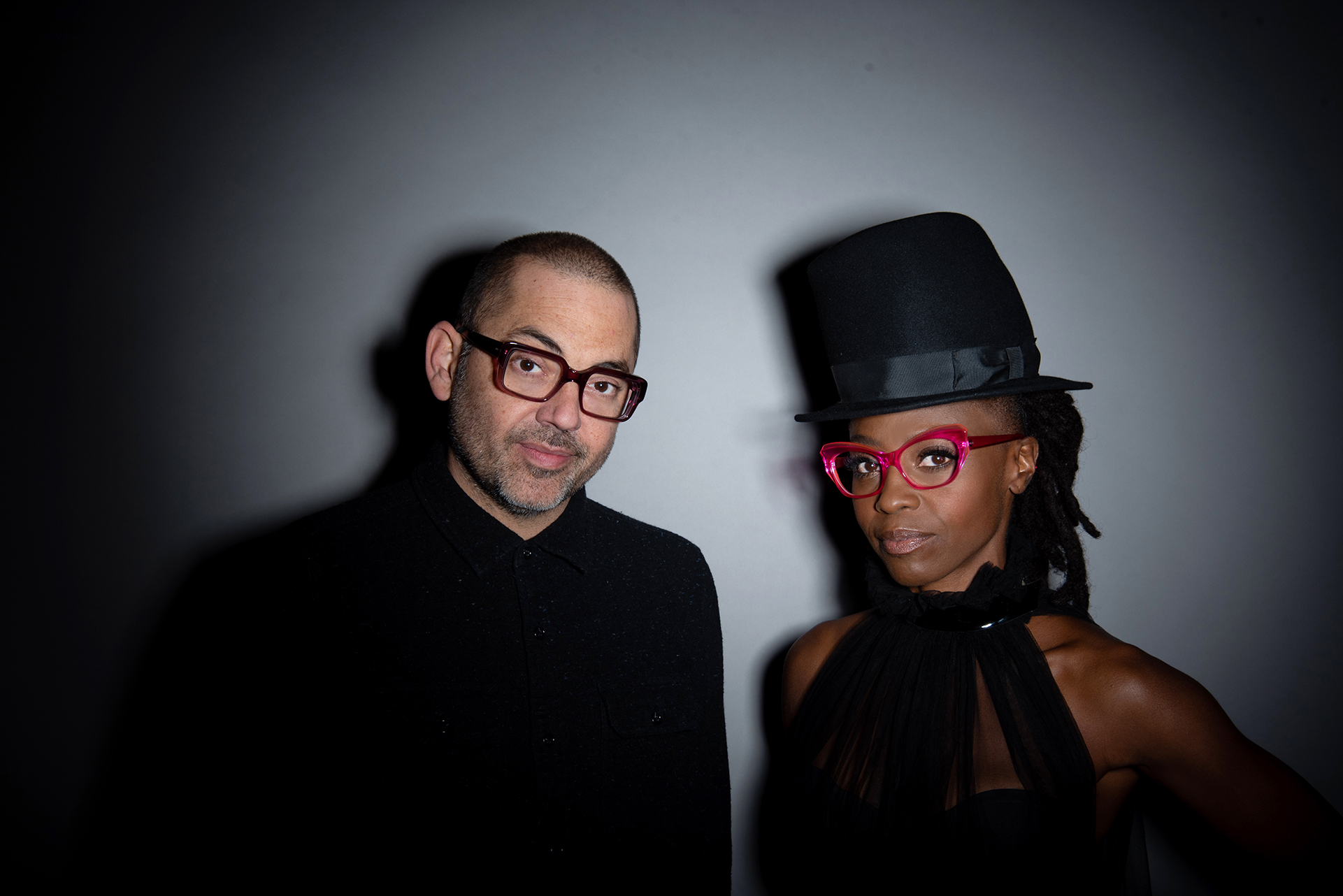
©Michelle Hayward
In March 2020, Skye and Ross were nearing the end of another long tour – they can go years without visiting the same country twice – and the diary suddenly emptied. The pair are used to spending most of each year on the road. Once, they’d only play countries where their record company had an outpost. Now, they can see from the streaming platforms where people are listening and travel there to play.
“Cape Town was amazing,” remembers Ross of their 2018 South African gig. “We played at the beautiful Kirstenbosch Gardens in Cape Town with Table Mountain as the perfect backdrop. We had 5,000 people all singing along. North Africa, central America too. We try to get around the world as much as possible and love playing new places.”
Tourbus parked, they began writing what became their tenth album ‘Blackest Blue’. By December 2020, they’d finished 10 lustrous new songs touching on disintegrating familial and romantic relationships, love and kinship, the world around and the consolations of cannabis. On tour, Morcheeba is Skye (vocals), Ross (guitar), Dom Pipkin (keys), Skye’s husband Steve Gordon (bass) and Skye’s eldest son Jaega Mckenna-Gordon (drums). In the studio it’s mostly just Skye and Ross – he plays guitar, lap steel, bass, keyboards and percussion. Skye started playing the cello during lockdown, whenever she had a little time to herself. “It’s an instrument I’ve always wanted to learn ». Ross encouraged her to play it on the album and she does on ‘Falling Skies’.
Ross found lockdown idyllic at first. Writing on an acoustic guitar, sending ideas between his and Skye’s home studios in south London and Surrey. Spending time with his wife and kids, reading books about forests, psychedelic plants and quantum physics. “I had more time to play guitar,” he says happily. “It put me back in touch with feelings I hadn’t had since I was a teenager. When I started playing as a kid, it was a solitary thing, a meditation to transcend whatever shitty time I was going through”.
The duo let go, writing and playing what they felt like. “I had a poem I’d written about my free diving experience in Thailand,” Skye says about lead single Sounds of Blue. “‘Oh Oh Yeah’ is a song about getting stoned. Back in the day we didn’t think about singles and the ‘need to hear the chorus in 30 seconds’. You’d have seven, eight-minute songs. So we went for it.”
“We’re always trying to find a sound that already should have existed but didn’t,” explains Ross. “A song that went missing sometime in 1969, an obscure Morricone-esque soundtrack… Skye sounds like sweet molasses, so we wanted to mix that with a gravelly male voice as a contrast.”
Falling for the rich, traditional yet modern quality of American folk group The Barr Brothers after seeing them live a couple of times, Ross contacted singer Brad Barr, sharing a few ideas before alighting on a sketch of a gorgeous piano ballad that became ‘Say It’s Over’. Brad came with the first two lines, and said “…it is fair to say it’s a breakup song…”
Then Ross was listening to the radio and heard a song so good he had to pull the car over to Shazam it. “It sounded like an old Mississippi blues record!” It was singer-songwriter Duke Garwood. Ross enlisted him for the closing duet ‘The Edge of the World’. “Duke’s voice is very deep and rich which suited it perfectly. We wanted that kind of voodoo vibe,” Ross enthuses. “He makes most of his records in the Mojave Desert with Mark Lanegan but he’s from Hastings.”
‘The Moon’ is a cover originally by Irena Žilić, a Croatian singer-songwriter. Ross fell in love with the song when they shared a bill in Zagreb with Irena and asked her permission to cover it. Skye added another verse to it and that is where the album title ‘Blackest Blue’ came from.
Perhaps Skye’s gloriously unruffled vocal tone means some people don’t catch the darkness in lyrics like; “Put your knife away, I’ve already cut my heart out”, from the album opener or the despairing; “Ain’t gonna lie, feel like I wanna die”, from ‘Killed Our Love’. There’s plenty of hurt that walks with the hope when Skye sings.
The band saw intense protesting up close in Chile, first stop on their 2019 south American tour. Skye and Steve were sightseeing in Santiago on the afternoon of the gig, moving through the estallido social, a noisy but good-natured demonstration against social inequality. As day dimmed into night, the protest darkened into rioting. Peaceful banging of pots and pans became soldiers firing rubber bullets and tear gas at protestors. There were already too many fans queuing at the venue to cancel the gig. And no way to get there but on foot, through the fires and riot police, past the burned-out buses blocking the roads, even though Skye’s son was recovering from a broken ankle. Weeks later, he’d get stopped by security at Gatwick when they found traces of explosives from the riot on his crutches. “I walked with my dress over my face,” Skye says; “our local rep was obviously panicked, which made me even more nervous. My heart was racing, my eyes sore from the tear gas.”
Despite the chaos, the gig went well, charged by a strange and surreal energy. By the end, all the roads around the venue were shut and filled with armoured vehicles, so the band played on, taking requests from the fans, then everyone hung out until it was safe to leave. It reminded them that, whatever happens in the world outside, there’s nothing like the healing power of music to bring us all together.
When Skye was writing lyrics for ‘Falling Skies’, she was thinking about her family, Black Lives Matter and the very white village they’ve made a home in. “I don’t know if it was paranoia,” she says; “but I looked at people and wondered, do you hate black people? It made me a lot more aware of where I was living. Having chats with the other black family in the village, wondering if we should move somewhere that had more diversity.”
Skye was brought up by white parents in East London, supposedly temporarily, but she was never able to go back to her biological mum. “I was six weeks old when I came to my foster parents.” Skye had a happy childhood, although growing up in a white family made her aware of race in a way that most children never are. “I always felt like apologising for being black,” she remembers. “Wanting not to alienate white people. I was a quiet child growing up. Studying fashion helped to bring me out of myself.”
It was 1994 when Ross met east Londoner Skye at a party, she ended up dating his mate who mentioned that Skye could sing. Skye was not happy about it. “Why did you tell them I could sing?!” Her only experience was a local singing class, some backing vocals in a funk band, and one try at busking in Covent Garden. She wasn’t ready to sing into a microphone, or in front of people – but it was a chance remark that changed their lives. Ross and his brother Paul wrote and recorded their debut single ‘Trigger Hippie’ with Skye which effectively started the group Morcheeba as a trio and got them an indie record deal. They released the acclaimed debut album ‘Who Can You Trust?’ in 1996 and inevitably started playing live with a first gig at The Jazz Cafe in London.
Over the next few years the band went global with ‘Big Calm’ (1998), ‘Fragments of Freedom’ (2000) and ‘Charango’ (2002) and the brilliance of signature songs ‘The Sea’ and ‘Rome Wasn’t Built In A Day’. They produced an album for Talking Heads legend David Byrne, got film soundtrack work from Morcheeba fan and Oscar-winning director Steven Soderbergh and in 2003 were the first western band to do a full tour of China. But Skye was ousted from the band that year when Ross’ brother DJ/producer Paul wanted to change direction, and she didn’t feature on ‘The Antidote’ (2005) or ‘Dive Deep’ (2008).
Meanwhile, Ross moved to LA in 2006 and built a studio in the Hollywood Hills for recording with Morcheeba and soundtrack productions. “I spent a lot of time out in the desert taking psychedelics and living out some acid rock fantasy,” he concedes. After releasing two solo albums ‘Mind How You Go’ and ‘Keeping Secrets’, Skye agreed to return to Morcheeba in 2009. The albums ‘Blood Like Lemonade’ (2010) and ‘Head Up High’ (2013) followed. Paul then left in 2015 turning the band into a duo.
Since then the pair have become closer and they got back to work, first making an album as Skye & Ross, then ‘Blaze Away’ (2018) as Morcheeba. “The connection we have now is great,” Skye reveals. “We understand each other, and we’re both hard working. Our agent might say, ‘oh it’s a gruelling schedule, sometimes five gigs in a row…’ and we’ll both immediately say YES!”
Ultimately, « Blackest Blue is about finding a way through the darkest of times and emerging the other side changed but intact. »







